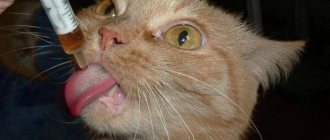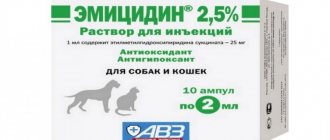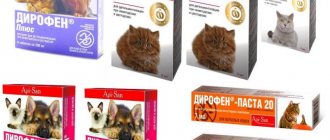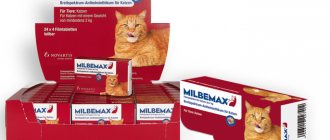| Place | Name | Characteristics in the rating |
| The best dewormers for cats |
| 1 | Drontal | The best anthelmintic according to user reviews |
| 2 | Milbemax | Drug recommended by veterinarians |
| 3 | Prazitel | The most popular and affordable drug |
| 4 | Dironet | Ease of administration and fast action |
| 5 | Celandine Glistogon | Profitable price |
| The best dewormers for dogs |
| 1 | Azinox plus | Best reviews |
| 2 | Milprazone | The safest and most effective |
| 3 | Prazicide | Time-tested drug |
| 4 | Procox | The best option for puppies |
| 5 | Helminthal | For large and capricious dogs |
How to feed a cat a pill
global $ads_google; //data-ad-slot=”2475549904″ $ads_google = empty($ads_google) ? false : true; ?> if ($ads_google == false) {?>
$ads_google = true; ?> } ?>
Compact anti-worm tablets are given to your pet by placing them in a piece of meat, cutlet or fish. If the animal refuses to swallow the medicine, a tablet dispenser will help solve the problem. This device is known as an introducer or Pet Piller. Another method is to turn the anthelmintic tablet into a suspension. The medicine is dissolved in a small amount of water and injected onto the root of the tongue using a syringe. It is very important to hold your pet tightly to avoid injury or loss of medication.
Why are parasites dangerous?
By settling in a cat's body, parasitic worms cause enormous harm to its health. Intestinal helminths injure the mucous membrane of the stomach and intestines, causing internal bleeding and pain. If they multiply excessively, worms can cause obstruction of the intestinal tube. Parasites take away a significant portion of the nutrients, thereby causing the animal to lose weight and lose immunity. Worms produce a large amount of waste products, which are toxins for the host animal. Intoxication and destruction of the tissues of the affected organs, primarily the liver, begins.
Pulmonary helminths, affecting the respiratory organs at a certain stage, cause shortness of breath, coughing, and wheezing. This directly makes breathing difficult. Heartworms in cats impair the blood supply to the body. Once in the heart, heartworms do not leave it and ultimately cause sudden death of the animal due to cardiac arrest.
Communication and contact with a sick pet can result in a family member being diagnosed with helminthiasis.
Prevention of helminths
To maintain the health of the furry and the safety of humans, it is necessary to regularly carry out prevention of helminthic infestation, which includes:
- medicinal treatment;
- compliance with feeding and care recommendations.
For preventive purposes, medications are prescribed that should be taken once monthly or quarterly. In addition, it is necessary to treat your pet with insecticides.
You should not feed your cat raw meat and fish. If the animal is domestic, then avoid contact with street inhabitants. The litter tray must be treated using disinfectants.
A worm that lives in the human body.
Review of deworming medications for cats
The range of modern anthelmintics allows you to choose a medicine that suits your cat’s age and health condition. Anthelmintics are available in the form of tablets, suspensions, drops on the withers, pastes, injections, sugar cubes. Each form has its own set of active ingredients, contraindications, side effects, and price.
global $ads_google; //data-ad-slot=”2475549904″ $ads_google = empty($ads_google) ? false : true; ?> if ($ads_google == false) {?>
$ads_google = true; ?> } ?>
Based on the nature of their action, anthelmintic drugs are divided into highly specific and complex. The former are used for targeted treatment after the pathogen has been identified, and the latter for preventive purposes. Antihelmintics also differ in their mode of action. The death of parasites occurs as a result of:
- depression of the nervous system;
- paralysis of the muscular system;
- metabolic disorders;
- destruction of integumentary tissues.
If there are discrepancies in information sources, you must follow the instructions included in the package.
An overview of the most popular deworming remedies, which are most often recommended by veterinarians, is presented in the video:
Drops on the withers
| Name | Active substance | Frequency of application and duration of action | Dosage, | Average price, rub. | Photo |
| Inspector Total | Fipronil, moxidectin | Once for 2 months | 0.1 ml per 1 kg of weight | 300-350 | |
| Profender | Emodepside, praziquantel | Once per month | 0.35 ml per 2.5 kg | 850 | |
| Advocate | Imidacloprid, moxidectin | Once per month | 0.1 ml per 1 kg | 1200-1400 | |
| Dironet | Praziquantel, ivermectin | Once per month | 0.2 ml per 1 kg | 350-400 | |
| Broadline | Esprinomectin, praziquantel | Once per month | 0.3 ml per 2.5 kg | 700-800 | |
| Drontsit | Praziquantel | Once per month | 0.5 ml per 2.5 kg | 300-250 |
The liquid, which is poisonous to parasites, is contained in a disposable pipette. Drops are applied to intact skin on the withers along the spine, that is, where the cat cannot lick off the medicine. After applying the drip drug, the pet cannot be bathed for four days, and it is not advisable to stroke or pick it up for 24 hours. The active substances penetrate the blood and, having reached the localization site of the helminths, infect them. Some anthelmintic drugs act without penetrating the vascular barrier.
Suspensions
| Name | Active substance | Frequency of application and duration of action | Dosage | Average price, rub. | Photo |
| Dironet | Pyrantel pamoate, praziquantel, ivermectin | Once per month | 1 ml per 1 kg | 150-200 | |
| Piradek | Pyrantel pamoate | Once for 3 months | 1 ml per 1 kg | 100-300 | |
| Prazicide | Praziquantel, pyrantel | Once for 3 months | 1 ml per 1 kg | 100-150 | |
| Febtal combo | Praziquantel, albendazole | Once for 3 months | 1 ml per 1 kg | 150-200 | |
| Prazitel | Praziquantel, pyrantel pamoate | Once for 3 months | 1 ml per 1 kg | 150-300 | |
| Celandine | Praziquantel, pyrantel pamoate | Once for 3 months | 1 ml per 1 kg | 100-150 |
The anthelmintic agent in the form of a suspension is shaken before use. If you need to give a small dose of medicine, it is advisable to first dilute it with a small amount of boiled water. The need for a diet or the use of a laxative is prescribed only for those remedies that act on an empty stomach. The suspension is injected onto the root of the cat's tongue using a plastic measuring syringe.
global $ads_google; //data-ad-slot=”2475549904″ $ads_google = empty($ads_google) ? false : true; ?> if ($ads_google == false) {?>
$ads_google = true; ?> } ?>
Pills
| Name | Active substance | Frequency of application and duration of action | Dosage | Average price, rub. | Photo |
| Azinox | Praziquantel | Once for 3 months | 0.5 mg per 10 kg | 100-150 | |
| Alben S | Praziquantel, albendazole | Once for 3 months | 0.6 mg per 5 kg | 100-150 | |
| Dironet | Pyrantel pamoate, praziquantel, ivermectin | Once for 3 months | 0.5 mg per 10 kg | 100-200 | |
| Dirofen | Pyrantel, fenbendazole | Once for 3 months | 200 mg per 5 kg | 200-350 | |
| Drontal | Praziquantel, pyrantel embonate | Once for 3 months | 350 mg per 4 kg | 300-350 | |
| Kanikquantel Plus | Praziquanten, fenbendazole | Repeat after 2-3 weeks for 3 months | 550 mg per 10 kg | 100-200 |
The tablet form of anthelmintics is considered the most common. Tablets and capsules do not require special storage conditions. The need to abstain from food for each type of deworming tablet is prescribed in the instructions.
Products for kittens
It is advisable that antihelminthic drugs for young cats be prescribed by a veterinarian. They must be safe, low-toxic and effective against parasites. It is not advisable to dilute the suspension or divide tablets intended for adult cats. Pet pharmacies have products intended specifically for kittens.
From the age of three weeks, babies are allowed to be given Drontal, Prazicide, Trontsil K, Kanikvantel for deworming. For five-week-old kittens, the deworming drug Profender is intended, and from six-week-old kittens - Milbemax. When three months are reached, the permitted list is supplemented by Pratel, Febtal, Polyverkan, and Inspector.
Milbemax
Anthelmintic tablets for kittens contain milbemycin and praziquantel as active ingredients. Thanks to its complex action, the anthelmintic is effective in combating various parasites. The medicine belongs to the group of moderately dangerous and in recommended quantities is not toxic to a growing organism. To achieve an anthelmintic result, a kitten weighing 0.5-1 kg requires 1/2 tablet. The advantage of the drug is that it can be given to the kitten along with food without laxatives. The cost of Milbemax for kittens is from 150 rubles.
Poliverkan
The sweet anthelmintic drug is available in the form of sugar cubes weighing 8 grams each. The therapeutic effect is due to the combination of oxybendazole and niclosamide. Polyvercan is prescribed to young cats whose weight exceeds 1 kg. The dose consists of half a cube per 1-5 kg of animal weight. It is added to the kitten's food or dissolved in drinking water. For treatment purposes, the dose is repeated after 10 days. And then they give the pet a prophylactic dose once a quarter. The average price for sugar cubes, packaged in eight pieces, is 400 rubles.
When is it necessary to worm a cat?
There are many sources of worm infection in a cat's life. These can be raw animal products (meat, fish, eggs), dirty water. The threat is posed by blood-sucking insects, whose saliva introduces parasites into the animal’s blood. The risk increases when a domestic cat comes into contact with outdoor cats. Any object on the street can contain helminth eggs on its surface. In this regard, every responsible owner of a furry pet knows about the need for timely deworming. The question arises when to give your cat an anthelmintic.
global $ads_google; //data-ad-slot=”2475549904″ $ads_google = empty($ads_google) ? false : true; ?> if ($ads_google == false) {?>
$ads_google = true; ?> } ?>
Antihelmintics must be prescribed if the diagnosis is confirmed. The dose of the anthelmintic drug is selected based on the animal’s body weight and age. Preventive deworming for an adult animal should be repeated monthly or every three months, that is, 4 times a year. This pattern should not be particularly violated if the cat is walking outside. In adult cats, signs of helminthiasis do not always manifest themselves to a significant degree, and because of this, the attention of even vigilant owners is dulled. Therefore, regular preventive use of anthelmintic drugs is mandatory even for completely domestic pets.
Some anthelmintics are given to the animal again after 10 days, since their active ingredients kill only adult worms and do not affect eggs. After 10-14 days, larvae emerge from the eggs, which die under the influence of a repeated dose of poison.
Unscheduled deworming is required before elective surgery or vaccination. Parasites weaken the cat's immunity, so in order to avoid negative consequences, before administering the vaccine (about 10 days in advance), it is necessary to use a deworming remedy.
Kittens begin to be given anthelmintics from the age of two months. Some anthelmintic drugs can be used after one month.
Can there be side effects?
When giving your cat deworming medication, you need to be aware of the side effects. They are possible in case of individual intolerance to the drug, poor health, overdose, or exceeding the shelf life of the drug. If your cat experiences at least one negative effect, you should consult your veterinarian. Side effects include:
- vomiting and/or diarrhea;
- muscle tremors;
- difficulty breathing;
- paleness of the integument;
- lethargy and apathy.
You cannot give several anti-worm medications to your cat at once. This can cause severe poisoning.
To speed up your pet’s recovery, reduce intoxication from anthelmintics, and improve the condition of the intestines when removing dead helminths, veterinarians prescribe special sorbent preparations. The veterinarian talks about the need for such funds:











